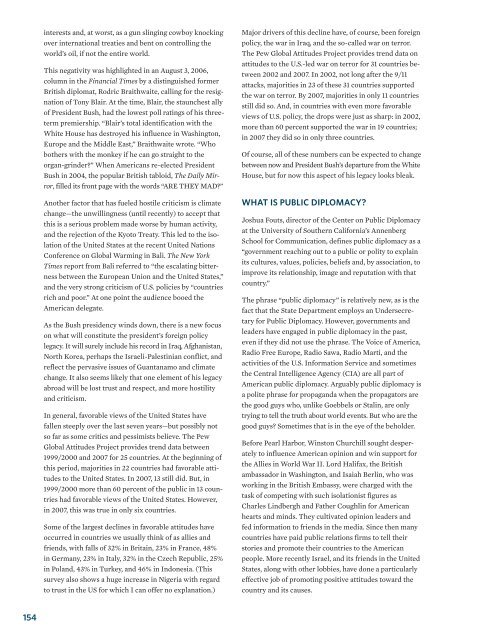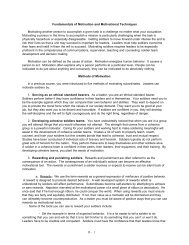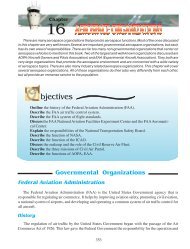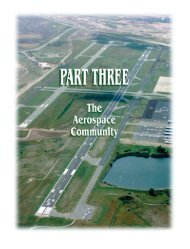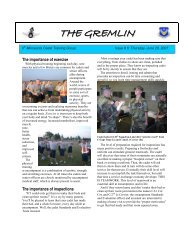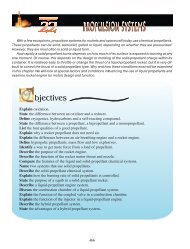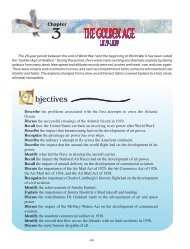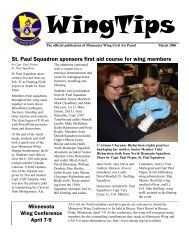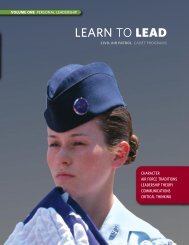interests and, at worst, as a gun slinging cowboy knockingover international treaties and bent on controlling theworld’s oil, if not the entire world.This negativity was highlighted in an August 3, 2006,column in the Financial Times by a distinguished formerBritish diplomat, Rodric Braithwaite, calling for the resignationof Tony Blair. At the time, Blair, the staunchest allyof President Bush, had the lowest poll ratings of his threetermpremiership. “Blair’s total identification with theWhite House has destroyed his influence in Washington,Europe and the Middle East,” Braithwaite wrote. “Whobothers with the monkey if he can go straight to theorgan-grinder?” When Americans re-elected PresidentBush in 2004, the popular British tabloid, The Daily Mirror,filled its front page with the words “ARE THEY MAD?”Another factor that has fueled hostile criticism is climatechange—the unwillingness (until recently) to accept thatthis is a serious problem made worse by human activity,and the rejection of the Kyoto Treaty. This led to the isolationof the United States at the recent United NationsConference on Global Warming in Bali. The New YorkTimes report from Bali referred to “the escalating bitternessbetween the European Union and the United States,”and the very strong criticism of U.S. policies by “countriesrich and poor.” At one point the audience booed theAmerican delegate.As the Bush presidency winds down, there is a new focuson what will constitute the president’s foreign policylegacy. It will surely include his record in Iraq, Afghanistan,North Korea, perhaps the Israeli-Palestinian conflict, andreflect the pervasive issues of Guantanamo and climatechange. It also seems likely that one element of his legacyabroad will be lost trust and respect, and more hostilityand criticism.In general, favorable views of the United States havefallen steeply over the last seven years—but possibly notso far as some critics and pessimists believe. The PewGlobal Attitudes Project provides trend data between1999/2000 and 2007 for 25 countries. At the beginning ofthis period, majorities in 22 countries had favorable attitudesto the United States. In 2007, 13 still did. But, in1999/2000 more than 60 percent of the public in 13 countrieshad favorable views of the United States. However,in 2007, this was true in only six countries.Some of the largest declines in favorable attitudes haveoccurred in countries we usually think of as allies andfriends, with falls of 32% in Britain, 23% in France, 48%in Germany, 23% in Italy, 32% in the Czech Republic, 25%in Poland, 43% in Turkey, and 46% in Indonesia. (Thissurvey also shows a huge increase in Nigeria with regardto trust in the US for which I can offer no explanation.)Major drivers of this decline have, of course, been foreignpolicy, the war in Iraq, and the so-called war on terror.The Pew Global Attitudes Project provides trend data onattitudes to the U.S.-led war on terror for 31 countries between2002 and 2007. In 2002, not long after the 9/11attacks, majorities in 23 of these 31 countries supportedthe war on terror. By 2007, majorities in only 11 countriesstill did so. And, in countries with even more favorableviews of U.S. policy, the drops were just as sharp: in 2002,more than 60 percent supported the war in 19 countries;in 2007 they did so in only three countries.Of course, all of these numbers can be expected to changebetween now and President Bush’s departure from the WhiteHouse, but for now this aspect of his legacy looks bleak.WHAT IS PUBLIC DIPLOMACY?Joshua Fouts, director of the Center on Public Diplomacyat the University of Southern California’s AnnenbergSchool for Communication, defines public diplomacy as a“government reaching out to a public or polity to explainits cultures, values, policies, beliefs and, by association, toimprove its relationship, image and reputation with thatcountry.”The phrase “public diplomacy” is relatively new, as is thefact that the State Department employs an Undersecretaryfor Public Diplomacy. However, governments andleaders have engaged in public diplomacy in the past,even if they did not use the phrase. The Voice of America,Radio Free Europe, Radio Sawa, Radio Marti, and theactivities of the U.S. Information Service and sometimesthe Central Intelligence Agency (CIA) are all part ofAmerican public diplomacy. Arguably public diplomacy isa polite phrase for propaganda when the propagators arethe good guys who, unlike Goebbels or Stalin, are onlytrying to tell the truth about world events. But who are thegood guys? Sometimes that is in the eye of the beholder.Before Pearl Harbor, Winston Churchill sought desperatelyto influence American opinion and win support forthe Allies in World War II. Lord Halifax, the Britishambassador in Washington, and Isaiah Berlin, who wasworking in the British Embassy, were charged with thetask of competing with such isolationist figures asCharles Lindbergh and Father Coughlin for Americanhearts and minds. They cultivated opinion leaders andfed information to friends in the media. Since then manycountries have paid public relations firms to tell theirstories and promote their countries to the Americanpeople. More recently Israel, and its friends in the UnitedStates, along with other lobbies, have done a particularlyeffective job of promoting positive attitudes toward thecountry and its causes.154
But if public diplomacy is not new, the focus on it has palpablyincreased. What has changed is the belief that thepublic relations techniques used domestically by politicians,corporations, and advocacy groups to influence theattitudes and perceptions of the American public can alsobe used by governments to influence public opinion inother countries. Madison Avenue and the public relations’industry know how to influence hearts and minds. Whynot use their skills to win more friends around the world?Or to reduce Muslim hostility to the United States? Thefailures of public diplomats such as Charlotte Beers andKaren Hughes show how difficult this is. Nevertheless,many countries increasingly buy full-page ads and multipagesupplements in major newspapers and magazines totell Americans how wonderful their countries are.THE LIMITS OF SPINUnderlying much of the political support for Americanpublic diplomacy is the belief that public relations techniquescan make world opinion more supportive of, or atleast less hostile to, U.S. policies—without any change inthese policies. Some advocates seem to believe that, sinceAmerican policies are inherently honorable and ethical,all that is needed is to explain them more effectively andpeople will think better of America. Corporate executivesoften feel they can improve their companies’ reputations,and politicians their popularity—all through communication.Occasionally, but not often, they are right.Even where press coverage of a country improves, it isdifficult to determine how much of the improvement wascaused by public diplomacy. An interesting column inIzvestiya (mentioned in The Week, August 18, 2006)reported: “To change world opinion, the Kremlin hasturned to an American public relations firm. Severalmonths ago, the Kremlin hired Ketchum, hoping to combatthe ‘almost entirely negative’ press Russia was gettingin the run-up to the Group of Eight conference in St. Petersburg.”Ketchum used its “numerous connections injournalism to plant ‘objective and even favorable’ articlesabout Russia in newspapers in the U.S. and Britain. Still,whether those articles had any substantial effect on policymakersis debatable. Russia expert Marshall Goldmanof Harvard says the reason Russia wasn’t criticized at thesummit was because everyone was distracted by the warin the Middle East. ‘As far as I know,’ he said, ‘Ketchumhad nothing to do with what was happening in Lebanon.’”Sometimes, it may not be possible to separate publicdiplomacy from traditional diplomacy—to say where oneends and the other begins. One of the great successes ofPresident George H. W. Bush’s diplomacy in the first GulfWar was in forming a U.S.- led coalition that includedMuslim and Arab forces. Almost all the world’s governments,explicitly or implicitly, supported the liberation ofKuwait and the invasion of Iraq. One of the reasons fornot “pushing on to Baghdad” was the fear of gettingbogged down there. However, another important considerationwas the belief that the coalition would fall apartand alienate both governments and publics in the Muslimworld. This was a case in which an understanding of foreignpublic opinion influenced policy, and not merely anexercise in communication.Effective public diplomacy should, I believe, work handin-glovewith traditional diplomacy. It is understood thattraditional diplomacy involves give and take, that compromisesare often necessary, and that two-thirds of a loaf(or even half ) is better than no loaf. Likewise, our publicdiplomacy should involve both give and take. It shouldhelp improve communications but it should also influencewhat the United States government does, and whatour leaders say or do not say.In the corporate world, wise chief executive officers(CEOs) make sure that their senior communications managers—whoare the guardians of their companies’ reputations—report directly to them. An effective approach tocorporate public relations is not didactic: “This is whatwe are doing, put the best spin on it.” It is interactive:“What should we do as a company and what should I doas the CEO—regarding actions, policies, programs, andcommunications—to ensure that this company and itsproducts and services are liked and trusted by the public,our customers, employees, suppliers, legislators, regulatorsand shareholders?” Successful public relations directorsdo much more than just manage communications.If traditional diplomacy often relies on “hard power,” theuse or possible use of military or economic strength toachieve its ends, public diplomacy often uses “softpower”—cultural, political, educational, and economicforces. Successful diplomacy based on hard power maycause people to respect, but also to fear, dislike, and distrustits users. Successful public diplomacy can win acountry not just respect but admiration. Examples of theuse of soft power include the education of likely futureleaders at American universities and publicizing U.S. scienceand technology, notably the space program, medicaladvances, and cutting-edge industry. For many yearsAmerican taxpayers have paid for foreign opinion leadersto visit the United States. President Bush’s policies towardAfrica and his recent visit to five African countries wereprobably successful uses of soft power. Many Africans aregrateful to the United States for its foreign aid and supportfor programs to reduce malaria and HIV/AIDS. Softpower, which obviously has much in common with publicdiplomacy, relies on culture and values to promote goodwilland respect between countries and people.155
- Page 1 and 2:
VOLUME FOUR STRATEGIC PERSPECTIVESL
- Page 3 and 4:
VOLUME FOUR STRATEGIC PERSPECTIVESL
- Page 5 and 6:
VOLUME FOUR STRATEGIC PERSPECTIVESL
- Page 7:
VOLUME FOUR STRATEGIC PERSPECTIVESL
- Page 10 and 11:
12CHAPTER 12INTRODUCTION TO STRATEG
- Page 12 and 13:
12.1 Strategic Leadership: Defining
- Page 14 and 15:
mandates or resolutions that would
- Page 16 and 17:
and ambiguity, aspiring strategic l
- Page 18 and 19:
12.2 National Security StrategyThe
- Page 20 and 21:
within our borders has always been
- Page 22 and 23:
front common challenges like violen
- Page 24 and 25:
and our strategy, not sector earmar
- Page 26 and 27:
thinking about organizations. She m
- Page 28 and 29:
A systemic approach to failure is m
- Page 30 and 31:
The late W. T. Grant Company is a r
- Page 32 and 33:
the resources - setting the directi
- Page 34 and 35:
focal point for describing and inte
- Page 36 and 37:
Consequently, we do not restrict th
- Page 38 and 39:
paragraphs, Web pages, then edit an
- Page 40 and 41:
Web, can be viewed as a CS attempt
- Page 42 and 43:
How to evaluate users and contribut
- Page 44 and 45:
13CHAPTER 13LEADING PUBLIC &VOLUNTE
- Page 46 and 47:
13.1 Leadership for Volunteers:The
- Page 48 and 49:
13.2 Take Root: Volunteer Managemen
- Page 50 and 51:
QualificationsClearly list educatio
- Page 52 and 53:
and effectively track their volunte
- Page 54 and 55:
• Understand rules for recognitio
- Page 56 and 57:
• Send a birthday card.• Submit
- Page 58 and 59:
and tested more than six decades af
- Page 60 and 61:
specific interests of the donors, v
- Page 62 and 63:
tain) tax-exempt status from the In
- Page 64 and 65:
Smucker, 1999).The Internal Revenue
- Page 66 and 67:
culture is necessary to ensure the
- Page 68 and 69:
13.4 The New Look of TransparencyBy
- Page 70 and 71:
ees for a couple of reasons: One, i
- Page 72 and 73:
13.5 Public and Private Management:
- Page 74 and 75:
TABLE 1:FUNCTIONS OF GENERAL MANAGE
- Page 76 and 77:
3. Career System. The model corpora
- Page 78 and 79:
islative charter - the Clean Air Ac
- Page 80 and 81:
In controlling performance, Chapin
- Page 82 and 83:
14CHAPTER 14AIRPOWER ASSTRATEGIC LA
- Page 84 and 85:
14.1 Strategic Air Power: Fulfillme
- Page 86 and 87:
carry it out. Their daylight raids
- Page 88 and 89:
you did not rely on strategic bombi
- Page 90 and 91:
14.2 Warden and the Air Corps Tacti
- Page 92 and 93:
ecomes one of applying sufficient i
- Page 94 and 95:
tification, and a Jominian claim to
- Page 96 and 97:
courage the rapid and widespread ex
- Page 98 and 99:
it to influence physical players in
- Page 100 and 101:
14.4 Basic Air Force DoctrineAF Doc
- Page 102 and 103:
earthquake-stricken Haiti. The worl
- Page 104 and 105:
perspective. Airmen do not divide u
- Page 106 and 107: Command and ControlCommand and cont
- Page 108 and 109: 14.5 Should the US Maintain the Nuc
- Page 110 and 111: form of human government.” 20 Dem
- Page 112 and 113: obtainable goal. See the Global Zer
- Page 114 and 115: 15CHAPTER 15ORGANIZATIONAL CULTURE
- Page 116 and 117: 15.1 Organizational CultureBy Doria
- Page 118 and 119: Review. This action strives to unco
- Page 120 and 121: gram will serve and then having the
- Page 122 and 123: ticipating the changes being made b
- Page 124 and 125: Many years of working with change p
- Page 126 and 127: At the least, the areas of concern
- Page 128 and 129: 15.4 Developing an Innovative Cultu
- Page 130 and 131: CONCLUDING THOUGHTSIn an ever-chang
- Page 132 and 133: global issues. Businesses that poss
- Page 134 and 135: — Sees the big picture—the shif
- Page 136 and 137: 16CHAPTER 16STRATEGIC COMMUNICATION
- Page 138 and 139: 16.1 Principles of Strategic Commun
- Page 140 and 141: 16.2 The Art of NegotiationBy Brend
- Page 142 and 143: 16.3 Negotiating Effectively Across
- Page 144 and 145: hidden areas can act as cultural ho
- Page 146 and 147: and four conflict styles. Hammer be
- Page 148 and 149: maintaining the relationship. As th
- Page 150 and 151: 25 Mitchell R. Hammer, “Chapter 1
- Page 152 and 153: tural, socioeconomic, and psycholog
- Page 154 and 155: for the win-win," during which time
- Page 158 and 159: Public diplomacy is surely about mu
- Page 160 and 161: But public diplomats do not have th
- Page 162 and 163: Photo courtesy of the familyThe LEA
- Page 164: THE CADET OATHI pledge that I will


